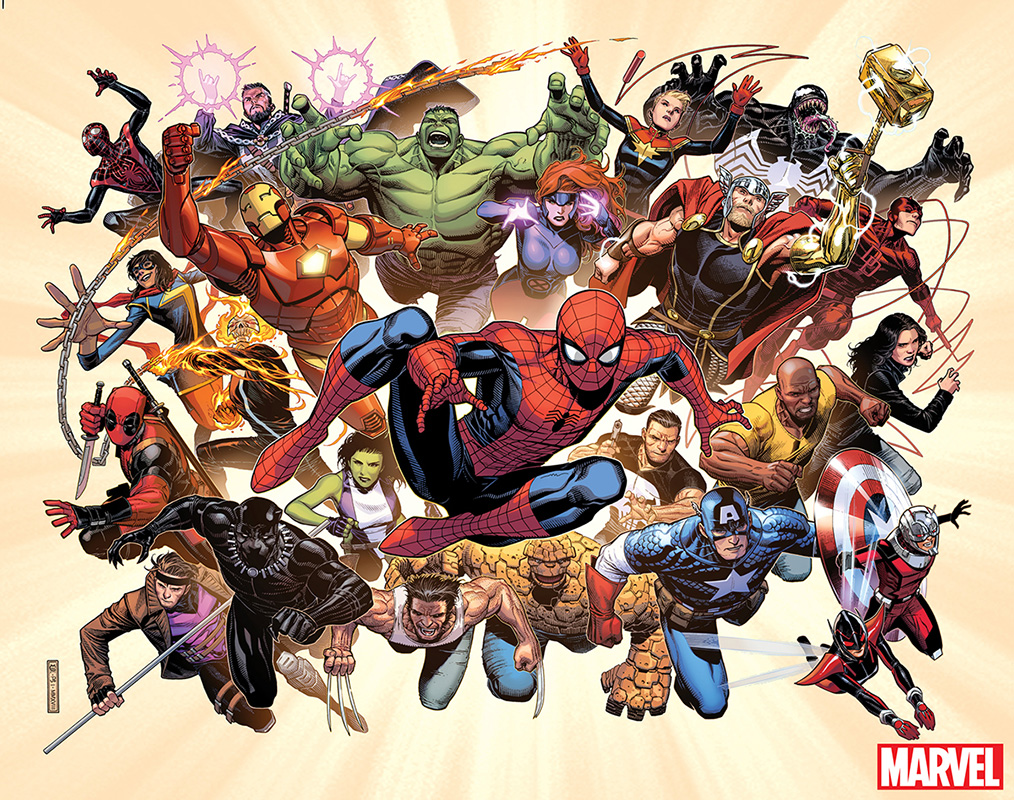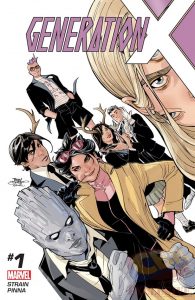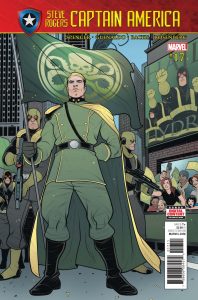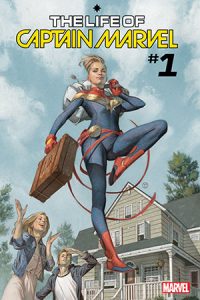
Marvel’s ‘Fresh Start’ is an unfortunate leap in the wrong direction
By Matty Hume, March 5 2018 —
The prominence of superhero-centred entertainment is now an undeniable fact of popular culture. And while we may hear whispers of oversaturation and fatigue, the recent triumph of the Marvel Cinematic Universe (MCU) blockbuster Black Panther and its place as one of the most successful theatrical releases of all time, suggests otherwise. That’s why many superhero fans see the Feb. 20 announcement by Marvel Comics of a line-wide relaunch, dubbed ‘Fresh Start,’ as an exciting prospect for accessible entry into the home medium of many easily recognizable characters.
But despite the surface-level flash and stack of new first issues, the latest rebranding by Marvel Comics is a super-powered leap backwards for the company’s progress in their diversity of creators and representation.
Fresh Start is the eighth relaunch of Marvel Comics since the top of the decade. Two different line-wide relaunches were enacted in 2010 and 2012. In 2015, Marvel combined their various universes with the ‘All New, All Different’ relaunch, bringing new heroes into the spotlight, including Kamala Khan as Ms. Marvel, Miles Morales as Spider-Man, Amadeus Cho as the Hulk, Jane Foster as Thor and Sam Wilson as Captain America. Marvel Comics relaunched again in 2016 — and again after the tumultuous line-wide crossover event Secret Empire in September 2017. And before you can catch your breath, Fresh Start is barrelling around the corner this May. The unending confusion of line-wide reboots aside, what truly makes Fresh Start a problem is the blatant disregard for representation in a medium that champions unparalleled creativity and empowerment.
So far, 13 titles have been announced for Fresh Start, including the return of Odinson as the titular character in Thor #1, Peter Parker in The Amazing Spider-Man #1 and Bruce Banner in The Immortal Hulk #1. Of the 13 titles announced, only The Life of Captain Marvel sees a female lead in Carol Danvers, as well as half of one in Ant-Man & The Wasp, which is only a five-issue mini-series. Further, of the 21 writers and artists attached to the new releases, all but Captain Marvel writer Margaret Stohl are men. These facts are even more significant given that the relaunch and announced titles are coming hot off the heels of the cancellations of a handful of Marvel’s most diverse comics.

Generation X #1
MARVEL/Terry Dodson
Made apparent in Marvel’s March 2018 solicitations was the end of many ongoing books with one troubling commonality. Cancelled titles included Gabby Rivera’s America, Sina Grace’s Iceman, Chris Hastings’s The Unbelievable Gwenpool, Christina Strain’s Generation X, Kelly Thompson’s Hawkeye and Mariko Tamaki’s She-Hulk — all of which feature female, LGBTQ+ and POC leads and creators.
The cancellations come about a year after Marvel Comics’ vice-president of sales David Gabriel came under fire for statements made to ICv2 at a retailer summit.
“What we heard was that people didn’t want any more diversity. They didn’t want female characters out there,” Gabriel said in a March 2017 interview.
Both Fresh Start and the wave of controversial cancellations are big events in the early days of Marvel Comics’ new Editor-in-Chief (EIC), C.B. Cebulski, who began his time in the position in November 2017. The announcement of Cebulski’s new role with the company was wrought with its own controversy.
The comics-centred entertainment website Bleeding Cool broke the story of Cebulski’s use of the Japanese pseudonym ‘Akira Yoshida’ to write books featuring Japanese themes and culture for Marvel Comics, beginning with THOR: Son of Asgard in 2004. “Yoshida” was hailed as a non-English writer that easily connected with American audiences. Cebulski’s lie was more than a simple name, bolstered by an elaborate backstory developed through interviews that purported “Yoshida” as a boy who grew up in Japan, learned English from superhero comics and movies and made it big in America. In reality, the white American used the pseudonym to write comics while maintaining an editor position with Marvel.
Fresh Start’s controversial roster doesn’t end at Marvel’s EIC. Front and centre in the promotional art for Fresh Start is the original web-slinging Spider-Man — another ill-thought-out aspect of Fresh Start. Slated to write the upcoming Amazing Spider-Man title is Nick Spencer, the man responsible for the rightfully anger-inducing Secret Empire that saw Steve Rogers — Captain America — become the fascist overlord of the United States.

Steve Rogers: Captain America #17
MARVEL/Elizabeth Torque
The problematic storyline began in Nick Spencer’s Captain America: Steve Rogers #1, released in May 2016. The issue ended with Roger’s saying, “Hail Hydra,” the statement of allegiance to the Marvel universe’s most despicable terrorist organization and Nazi analogue. For well over a year, Spencer and Marvel developed the controversial storyline into Secret Empire, the line-wide crossover event that saw 10 main issues with additional salvos, epilogues and tie-ins.
In a nutshell, Spencer’s opus had the history of Rogers rewritten by a cosmic entity that saw him trained by and wholeheartedly believing in the Hydra cause from the beginning of the character’s origin — implying the Jewish-American-created character was complacent in the Holocaust via Hydra’s Nazi alignment. The event included Rogers’s militant take-over of the United States, complete with the implementation of a fascist regime that involved the capture and encampment of Marvel’s fictional race of Inhumans.
Among large crossover events, Secret Empire was a flop — the second-worst selling in the history of Marvel Comics. The decision to place Spencer on the Amazing Spider-Man relaunch and to focus Fresh Start’s marketing on the title is an insult to the very recent memory of Marvel’s readership.
Marvel Comics has no excuse to shelve the diverse aspects of its developed universe or to prioritize their most problematic writer over underrepresented creators. For the year 2017, North America’s primary comic book distributor, Diamond Comic Distributors, placed total comic sales around $522 million. Of those dollars, just over 36 per cent belongs to Marvel Comics — the highest overall share out of all comic book publishers. As the industry leader and backbone of Marvel Studios’s phenomenally successful Marvel Cinematic Universe, Marvel Comics has the ability to lead by example and ensure their entire fanbase is fully represented by both characters and the creators behind them. Fresh Start is an unfortunate fall away from any progress the publisher has made in regards to representation and opportunity.

The Life of Captain Marvel #1
MARVEL/Julian Tedesco
Of course, there is some light to be found in Marvel’s Fresh Start in May. For prospective readers that have been dismayed by the often inaccessible world of the Marvel universe’s history, a fresh batch of issue-number-ones is sure to bring new fans, especially considering the highly anticipated MCU giant Avengers: Infinity War has been moved up to an April 27 release date. Margaret Stohl’s Life of Captain Marvel will be great for fans old and new, with the MCU’s Captain Marvel set to be released in March 2019. The Immortal Hulk is promising, placing the character in a horror setting in the most creative retcon of a character’s death in recent memory. Steve Rogers may find redemption under Black Panther writer Ta-Nehisi Coates, who is set to take over the title with Captain America #1. Coates outlined his own anxieties and thoughts on the upcoming series in an article for The Atlantic, which will undoubtedly convince many skeptics. And in general, centring around a widely recognizable roster is appealing to many longtime fans.
Even still, this could have been done without eliminating other voices, ultimately making Fresh Start a disservice to most underrepresented fans and communities that Marvel Comics have helped empower over the past decade.
“Here at Marvel, we tell stories that aim to entertain, inspire and amaze,” begins Cebulski in the Fresh Start announcement.
It’s a statement from an already problematic figure that rings hollow when the first measurable actions under their leadership were to dissolve a collection of titles that represented and employed women, LGBTQ+ and people of colour and relaunch the brand with the same men writing and drawing the same super-men. The demographic that Marvel’s Fresh Start aims to “inspire” is dangerously and blatantly narrow, especially considering Marvel Comics is the best-equipped to set a more promising standard.
